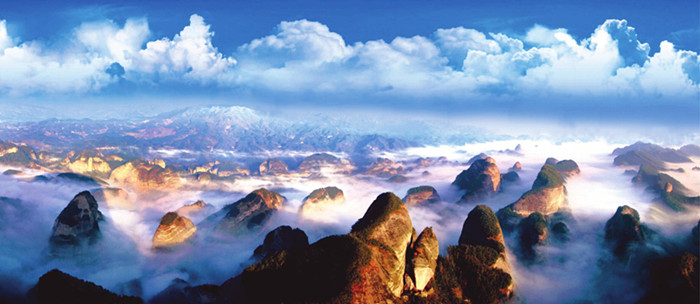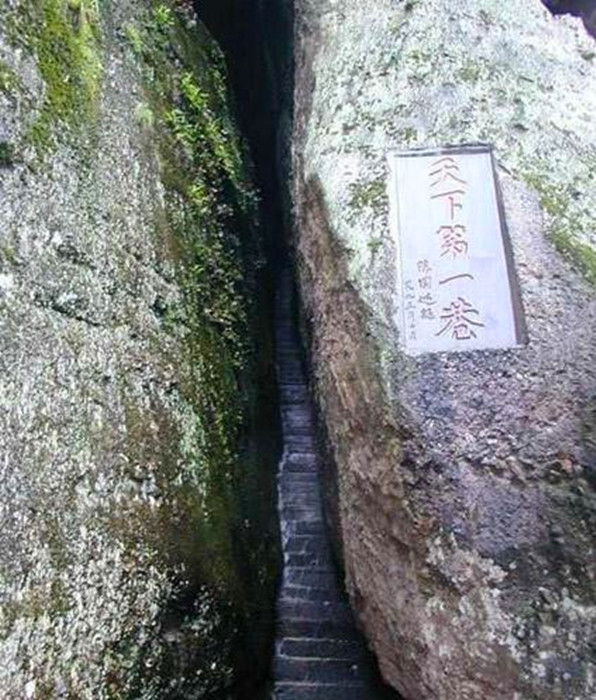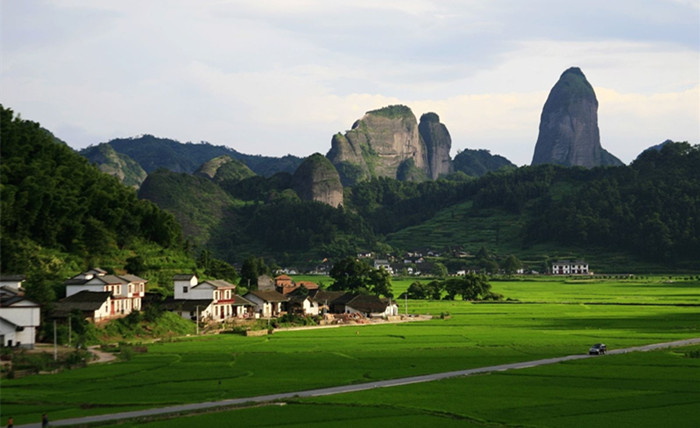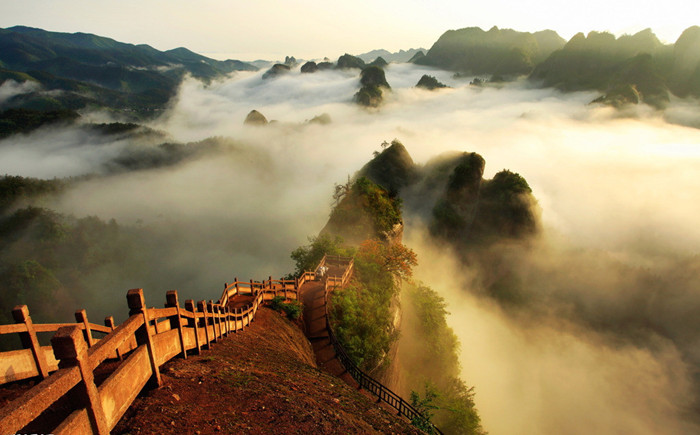The Green Fuyi River Embracing Red Mount Lang
Source:Shaoyang International CultureWriter:Tang LanTime:2014-12-30Clicks:次

Here the land used to be boundless ocean difficult to cross to the opposite shore. Two hundred million years ago, the mountain construction raised it up out of the surface of water, engraving it into the strong lofty Mount Lang wrapped in red color and the clear green Fuyi River of jade-like purity. Nature created the land’ s manly magnificence and also its womanly delicacy. Here on the land with a red mountain and a green river, red men and green women performed wonderful dramas of life and splendid symphonies of fate.
Now women’ s gracefulness and men’ s firmness exist in harmony between the river and the mountain of the world’ s natural heritage. I came here to watch, read and listen, experiencing the resolution of E Huang and Nv Ying searching for their husband in bitter rain, the perseverance of a Chu soldier’s widow in cold wind, the faithfulness of a communist general’ s wife under the old stone arch and the romance of a poet Ai Qing’ s devotion to his lover in moonlight. All this aroused my feelings in a large quantity that flooded my heart like rolling river water.

I
‘The character of Lang was made by Zhong Hua, and it has been specially for the name of the mountain ever since.’
The above lines of a poem by a great Hunan Confucianist Yu Dequan told us how the mountain got its name ‘Lang’.
Around four thousand years ago, in the land of ancient China there was a great man named Zhong Hua, who became famous for his filial piety when he was 20, was promoted by Emperor Yao when he was 30, and when he was 61 came to power with name of Emperor Shun in place of Emperor Yao. After 39 years’ rule, he gave up the throne, ending the traditional system of life-long controlling power. Having handed over the throne, Emperor Shun, then aged 100, traveled down inspecting the southern land. He went across the Dongting Lak, then along the Zi River and finally to the present Xinning County the upper reaches of the Fuyi River. He climbed up along a steep winding trace to the summit of a high mountain, on which he looked down at the surrounding mountains and saw white mist embracing lofty cliffs, mountain wind blowing huge pines, clouds rising and falling and peaks running like ten thousand of great whales swimming in the ocean. Seeing the splendid scene, Emperor Shun got excited and let out an exclamation, ‘What a good mountain! Lang’. ‘Lang’ means a good mountain in Chinese. Since then the character ‘Lang’ is a special word referring to this mountain in all Chinese dictionaries.
Having not got message about Emperor Shun, his two wives E Huang and Nv Ying set off in search of him. They followed Emperor Shun’ s footprints down to the Lang Mountains. Long distance, difficult journey and dangerous travel did not weakened their resolution to find their husband. They climbed the peaks, explored the bamboo forests and visited the villages, every place which Emperor Shun might have inspected, asking local people about his tracks.
Later, E Huang and Nv Ying got the news that Emperor Shun died on the wild field of Cangwu on his journey of south inspection. They were put in deep grief, treas pouring down, which formed streams flowing in valleys and some of which splashed upon bamboos, making them spotted. When they were mourning their husband’ s death on the Dongting Lake, the yellow reeds and white mist increased their sadness so much that they threw themselves into water, ending their lives in order to accompany Emperor Shun’ s soul.
‘Emperor Shun inspected southern land never to return,
Which made his two wives deeply grieved on water and cloud.
How many drops of bloody tears were shed nobody knew;
The bamboo remains spotted even today.’
The story of E Huang and Nv Ying searching for their husband on a journey of a thousand kilometers annotates the persistent pursuit of eternal love and the truth of life in eternity.

II
This land is extraordinary because out of here sprang up a large number of officials and generals in feudal dynasties, of whom 240 were high officials of minister-level. The old family temples scattered among hills still display the glory of the late Qing Dynasty. However, when I was roaming between the temples, the most I thought of were not those men’ s civilian achievements or martial merits but those men’ s women who were simple but pure, clear but but profound, tender but persistent.
One of those successful men was Jiang Zhongyuan. In the early years of Emperor Xianfeng’ s reign, he raised an army of 1500 valiant farmers in his hometown to fight battles for the country. The army fell cities one after another on their way of march, thus making a lot of military merits. This army was the origin of the famous Xiang Army. Due to his outstanding exploits, Jiang Zhongyuan was repeatedly promoted to a higher post and finally to Governor of Anhui Province. When he died, he was bestowed the title of ‘Loyalty Duke’ by the court.
Opposite to his brilliant deeds was his wife Chengshi’ s lonely life, persistent wait for her husband and devotion to the family. She never went out of her village and her heart never out of her thoughts of her husband. Every day, she labored at home or in the fields, walking alone on mountain paths, along field traces and through the narrow Heaven Lane. She could not produce a child, so she made a marriage of her husband to a second wife Yangshi. When Yangshi gave birth to a boy, she was happier than anyone else in the family.
When the whole family was still immersed in the happiness of getting a baby, word came that Jiang Zhongyuan committed suicide in a river owing to his defeat in Luzhou. She did not tell Yangshi the sad news because she was afraid that Yangshi could not put up with it. One year later Yangshi died, leaving her baby motherless. Then she took the responsibility of raising the child. She treated the child as her own, took good of him and finally brought him up.
Chengshi’ s life was ordinary, bitter and lonely, but her loyalty and devotion to the family was worth praising, and because of her loyalty and devotion added to her perseverance, her life became brilliant in commonness.
However, Chengshi was not the only one. There were more women like her in this land, such as the four brave girls from the Jiang Family, the women from the Liu Family of Governors Liu Kunyi and Liu Changyou and many others. The women of Mount Lang have their own personalities, but generally, they are simple, pure, laborious, ardent, tender, devoted and persistent. They have the characters of mountains and rivers.

III
History came down to the last century. In the land not far away from Mount Lang of Xinning County, there was a woman named Li Qingzhu, a communist general’s wife, who is the most worthy to be referred and sung of.
Across the green Fuyi River, walking along a stone-paved road through an erecting limestone arch, I came to a simple small village called Sandushui, where lived a few families. The old village came into being in the 3rd year of Daoguang’ s reign in the Qing Dynasty. As the road under the stone arch used to connect Xinning County and Dong’ an County, the village was once thriving.
It was from this village came out a communist general Wan Danping. Wan Danping was admitted to Yueyun Middle School of Changsha in 1922. During his study there he got acquainted with Mao Zedong, Yang Kaihui, He Shuheng, Xia Minghan and other communists. Influenced by them, he joined the Chinese Communist Party. In 1924, he was sent by Hunan Committee of the C.C.P. to Huangpu Military Academy for further study. After graduation, he joined the First Army of National Revolution. He participated in the two East Expeditions against Warlord Cheng Jiongmin and the North Expedition War. In the spring of 1927, he joined the army led by Ye Ting, taking the post of the battalion commander and then acted as the regimental commander. After the failure of Nanchang Uprising, he fought with his army between Chaozhou and Shantou, and then attacked Dongjiang. Due to the defeat of the battle at Jieyang, he was arrested and imprisoned in Changsha. After he was set free, he was sent to work underground in Shanghai.
It is true that a beauty loves a hero since ancient times. Li Qingzhu, born in a rich family in Xinning County, was pretty and graceful. She was the same age as Wan Danping. When studying in Changsha, she got to know Wan Danping and the two young people fell in love. Wan Danping risked his life in revolutionary work and his life was in danger every minute. But Li Qingzhu understood him and supported him resolutely.
At 28, she went to Shanghai to marry him. After a year later of happy marriage life, the Party organization sent Wan Danping to Guangxi Province to carry out military struggle. Wan could not stand Li living in Shanghai alone, so he had her go back home to await him. From that time, Li Qingzhu waited alone for her husband to return safe, healthy and glorious. Ten years passed. She held. Twenty years passed. She persevered. Her hope never died in her heart. Waiting days repeated endlessly. Maybe on misty mornings she watched the General Rock standing on the bank of the Fuyi River hoping for surprise news, and probably on afternoons lit by the setting sun, she prayed in a temple for her husband’s early return. The hard waiting gradually wore her youth and life.
She waited to the time when she saw New China founded and then she experienced the miserable Cultural Revolution, but still with no news of her husband’ s return. When she had waited for more than 40 years, the honor of a martyr’ s widow finally arrived upon her. At that time she was nearly 70. The truth was that her husband Wan Danping, as a comrade-in-arms of Deng Xiaoping and Zhang Yunyi’ s, Chief of Staff of the Eighth Red Army and Commander of the First Division, had laid his life in a battle field many years before. The hero’ s body had become earth, disappearing in the depth of time.
The name ‘Qingzhu’ means ‘green bamboo’ in Chinese, which symbolizes her character: loyalty and faithfulness. Li Qingzhu stood like bamboo while bamboo took on greenness for her. Her long waiting engraved her loyal and faithful love upon the stone arch in Wan Danping’ s home village and upon the rock of Mount Lang, which will endure eternally. Having recalled the story, I was put deep in thought. It seemed as if I saw Li Qingzhu standing on the summit of Mount Land.

IV
The last touching love story is about Poet Ai Qing and Wei Ying.
Perhaps one loves a land of hills and water just because a certain person lives there. As Bai Juyi and Su Dongpo say in their poems, a land becomes one’ s hometown if his heart settle down there. And the great British poet Sherry says, ‘The land that gives me love is my second hometown.’
Leaning against the Love Rock and bathed in the sun, I felt a pleasant warm feeling rising from my heart. I was in a exciting green garden with tender and beautiful grass and flowers waving and thick pine trees swaying in breeze. The scene reminded me of a picture that Wei Ying presented to Ai Qing. In the picture there was a garden with a small pine tree under a huge one. On the stem of the huge tree was written the name of Ai Qing, while on that of the small one was written the name of Wei Ying herself. Wei Ying was one of Ai Qing’ s students. She used the picture to indicate her love for Ai Qing. Even her notebook was full of the two characters of Ai Qing. Faced with these, Ai Qing was naturally moved. Then this both beautiful and talented girl from the land south of the Changjiang River broke through the conventional block and followed Ai Qing determinedly to Xinning County, where they led a sweet life full of sunshine and peace, leaving a beautiful love story to Mount Lang.
Ai Qing taught Chinese in Xinning. On holidays, they would travel to the wild fields of Mount Lang or ride in a boat on the Fuyi River. The beauty of the mountains and water and honey marriage life aroused the poet’ s passion and inspiration. In simple and peaceful Xinning he wrote a number of poems. One of them was Sand, which describes their leisurely mood:
‘The sun shines on a beach of sand,
On which are our footprints,
We go to the edge of river water,
Which is agitating in wind.
We call the boatman to cross,
But our shouts are taken away by wind.
Those were days with husband and wife in harmony like musical instruments harmonious with each other in a symphony. Wei Ying took careful care of Ai Qing’ s living. They took walks in breeze, played the violin in moonlight, accompanied each other in spite of hardships and watched wind and frost with smiles.
Although their marriage did not end with the end of their lives, in Wei Ying’ s memory, her days with Ai Qing in the small city of Xinning were happiest. Many years later she could still remember people and things in Xinning, the river and the mountains there. In particular, she could remember the warm company of each other in ordinary life among the water and mountains. And in Ai Qing’ s heart, no other place was as beautiful as Mount Lang, and no other love brought as much happiness as Wei Ying’ love for him did.

The majesty mountain and the tender river are embracing each other like a couple of lovers whether life or death occurs to them. In the land of Mount Lang, men shed blood fighting for the country and making achievements outside, while women stayed at home attending to their families and waiting their husbands’ return. Here when we cherish the memory of men who had distant ambitions, we should keep in mind those devoted women who had their husbands in deep hearts.
The green Fuyi River embraces red Mount Lang. Mount Land combines grand beauty, tender beauty and sad beauty as a whole on itself. Its beauty transcends time and space. It is a great beauty.
(The writer is a member of Hunan Writers’ Association and a member of Hunan Literary Reviews’ Association)
(translated by Yi Daoqun)
